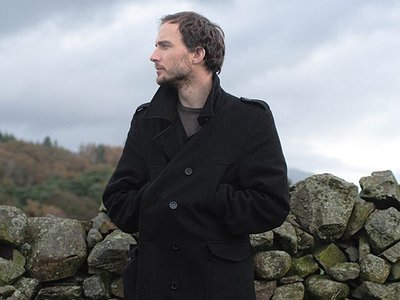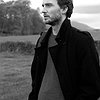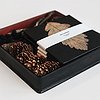Hearing the contours
What began in mourning has become, for Richard Skelton, a lasting quest for communion with the natural world. Known for the anguished and heartbreaking music that the Sustain-Release project yielded, the multi-instrumentalist has moved into a less personal but equally intense exploration of the history and culture of the British natural world in collaboration with poet and wife Autumn Richardson. Skelton's work has primarily been self-released and self-distributed using a range of monikers including A Broken Consort, Carousell and Clouwbeck through his Sustain-Release archive and more recently his Cumbrian-based publishing house Corbel Stone Press and New York label Tompkins Square. With a fondness for the intimacy of collaborating with not only other people but with the world around him, Skelton continues to draw inspiration from text, imagery and experience as he refines the possibilities of expression through artefact.
When did you start writing/producing music - and what or who were your early passions and influences?
I'm not sure when – there wasn't a eureka moment. Early teens, perhaps. I remember earlier – aged eight or nine maybe – being entranced by Jeff Wayne's 'War of the Worlds'. I begged my teacher to lend me the tape and made my own home recording. This was before tape-to-tape machines, so I had to borrow my sister's tape machine to play it, and recorded it on mine with the built-in microphone. It was a terrible recording, and yet it managed to pick up – during a quiet section – the sound of my mother calling us down for tea...
What do you personally consider to be the incisive moments in your artistic work and/or career?
Whilst in my early teens I discovered a Sunday afternoon radio show on BBC Radio Lancashire called 'On The Wire'. It was my first real exposure to 'non-mainstream' music – a bewildering array of sounds rubbing up against each other. In any one show you might hear Lee Perry, Iannis Xenakis, The Staple Singers, Fela Kuti, Captain Beefheart, King Tubby, Merzbow, Mr Fingers, Half Man Half Biscuit, Bert Jansch, The Meters and Rhys Chatham, to name but a few. I still remember the time I heard Meat Beat Manifesto's 'Radio Babylon' overdubbed with Allen Ginsberg's 'Howl'. It's a cliché, but the show really was a musical education, and it undoubtedly shaped my listening for many years to come.
Despite having a 'world music' remit in the fullest sense of the word, the show also championed local music, and frequently played tapes by experimental musicians in Lancashire and beyond. I think it was this sense of support that eventually encouraged me to submit my own recordings, and so in late 2001 I sent in a 3-inch CDR simply called 'Heidika'. To my surprise and great joy they played a track on the 19th of January, 2002. It was my first exposure of any kind, and was a pivotal moment for me. The kind people at 'On The Wire' have supported my work ever since, and even invited me to the studio in 2009 to be interviewed and to play a selection of my recordings. I owe a debt of gratitude to Steve Barker, Michael Fenton and Jim Ingham. I'm also happy to report that 2014 will be its 30th year of broadcast – I hope there will be many more.
Subsequent to that initial exposure, it was another radio show – the Wire magazine's 'Adventures in Sound and Music' on London's Resonance FM, and another Lancastrian, Tony Herrington, who supported my work and brought it to a wider audience. I'm deeply thankful for the help that Tony has given in championing my music, and for the positive response that it has received in the pages of the Wire magazine itself. That such a magazine endures as it does – in physical form – in today's economic climate, is nothing short of a miracle, and a signifier that it is doing something vital and relevant. Again – long may it continue.
What are currently your main compositional- and production-challenges?
I record acoustic instruments, and the challenge is to record them as authentically as possible. This could become an obsession, but I'm pragmatic about what I can achieve with the tools at my disposal. Once recorded, the process of composition involves transforming the sounds whilst somehow retaining something of their original essence. For me composition involves trying to coax 'music' into being from these disparate recorded sounds. It's a bit like making a sourdough starter. You add the constituent elements, stir, and then wait. Hopefully, if the conditions are right, something will happen and then it's essentially out of my hands. Something has occurred that is more than the sum of its parts. From then on the challenge is not to try and exert my own will over it. I might help give it shape here or there, but for me music is 'other' and deserves to be treated with awe.
What do you usually start with when working on a new piece?
There is usually some focus of attention. A place, a theme, an idea. 'Ridgelines', for example, is the music of two hills – Black Combe in Cumbria, and Cappanawalla in County Clare, Ireland. I spent a significant amount of time living near, and visiting, each, before commencing the recordings. For me proximity is vital, as is duration. The longer I can spend with something, the better – observing and experiencing a place in different seasons, light and weather. I've just spent the last 18 months walking the same track in the Cumbrian fells. Each day is different, and the same, simultaneously. I don't know if I am going to make some work about it. I don't force these things, but if something arises, then it will be informed by the cumulative impressions of those many visits.
How strictly do you separate improvising and composing?
I don't separate them as such. You might say that improvising is a method of composing. You could also say that the composing lies in working out which bits of improvising work, and which don't.
How do you see the relationship between sound, space and composition?
Books have been written on the subject. Anything that I can say here will be at best trite. In my own work the music is a rendering of space, or more accurately, place. It is a distillation or transmutation of landscape. The landscape is full of voices, audible and inaudible. Its contours and reliefs are a patterning of melodies, and the music I create is a string, resonating in sympathy.
Do you feel it important that an audience is able to deduct the processes and ideas behind a work purely on the basis of the music? If so, how do you make them transparent?
Not at all. The music isn't a vehicle for expounding an idea. It is its own thing. Provenance is important to me, though. Some of my recordings are composed of sounds recorded in specific places, and I feel that it's important to acknowledge that. I feel that a listener's experience is enriched by this knowledge. One way of doing this is through titles such as 'Noon Hill Wood' and 'Green Withins Brook', but it's a rather crude signifier. With the album 'Landings' each title corresponded with a chapter title in the accompanying book – both the book and music could be experienced independently, but they also intersected, and shed light upon one another. I've since produced a number of works that have textual, visual and musical components. I like the idea that these discrete forms emanate from the same source.







